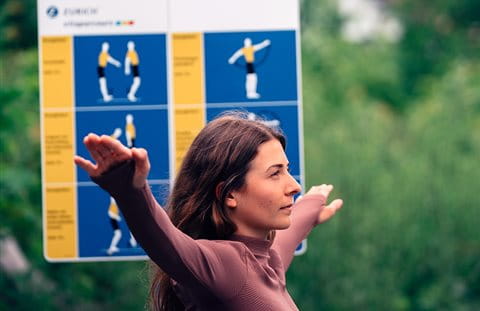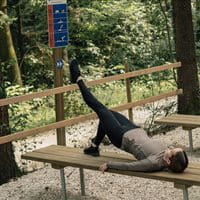Expert interview with psychologist Eva Deutschmann, Crisis Prevention Coach for Mental Health at Zurich Switzerland.
Are the winter blues a reality, or simply a cliche?
Some people feel entirely at ease during the "darker" months, they associate this time with pleasant experiences, traditions and winter sports. Some people are a little tired and rest more but are not necessarily saddened. Others experience the winter months as a dull, gray season and are temporarily slightly depressed. This can be seen, for example, when they feel tired, have less energy, are not as balanced and want to eat more carbohydrate-rich foods. In the case of such a mild depressive mood, therapy is not usually necessary. There are also people who suffer from winter depression, and who should seek professional support. The transitions are fluid and the demarcation between depression-as-illness and normal sorrow is not always easy.
Why do the darker months have such a big influence on our mood?
At our latitudes, the days are much longer in summer. Conversely, the winter nights in Switzerland last up to 16 hours, and so we receive fewer hours of daylight during the winter months. But daylight has an important physiological function: it influences our metabolism and controls our sleep-wake cycle via the chemical messengers serotonin and melatonin. During daylight hours, serotonin is formed. Serotonin is also known as the "feel-good hormone" and has a mood-lifting and relaxing effect.
In addition, serotonin plays a part in various bodily processes, such as the contraction and relaxation of blood vessels within the cardiovascular system. It also influences pain reception, the feeling of satiety after eating, and is involved in regulating body temperature. When it gets dark outside and less daylight hits the retina in the eye, the serotonin formed during the day is converted into melatonin in the pineal gland in the brain. In winter, the body produces more of the "sleep hormone" melatonin, which makes us tired.
What is happening in my body and brain when I feel depressed?
Particularly in winter, when we are exposed to less sunlight, the body produces less serotonin and more melatonin. This can contribute to our feeling tired, sluggish, and anxious, irritable, overstressed and may cause us to eat more than necessary. Since the chemical messengers serotonin and melatonin interact with one another, this can cause the sleep-wake cycle to move out of sync. We are listless, exhausted and want to sleep too much or cannot get a good night's sleep. Insufficient exposure to daylight can result in our not producing enough vitamin D. Low vitamin D levels are also associated with low mood and depression. After consultation with a specialist, it can be a sensible idea to take vitamin D supplements in drop form. Taking a stroll during the daylight also does you good – with appropriate protection from the sun, of course.
Why does exercise help to lift your mood?
When we exercise, we are doing something good for our brain and our entire body. We know that exercise – adapted to your personal capability – supports, for example, the cardiovascular system, musculoskeletal system, immune system, cell renewal and neuroplasticity, i.e. the ability of the brain to change and adapt. Many biochemical processes take place when we exercise and the chemical messengers adrenaline, noradrenaline, dopamine, serotonin and endorphins are released. They have an activating effect, drive us, provide us with feelings of happiness, motivate us to do more, and give us a sense of reward and inner satisfaction.
In addition, exercise helps change brain activity. When ruminating and thinking in circles, an area of the brain known as the prefrontal cortex is overstimulated. This is also active, when for example, we are planning something, solving complex problems, contemplating and in the decision-making process. When we exercise, activity shifts to further areas of the brain. We can distract ourselves and get other thoughts. In addition, exercise offers us an outlet for de-stressing, reducing feelings of anxiety and finding inner peace. We strengthen our feeling of self-worth and body awareness. It is best to schedule exercise as a regular part of the week. It takes effort beforehand, especially when it's cold and uncomfortable outside, but afterwards you feel much better.
What type of exercise has the most influence on our mental state and why?
There is no one form of exercise that combats a low mood. Regularity is far more important than the type of exercise: it does both mind and body good when we exercise regularly, especially in the fresh air. This can be a relaxed stroll, which is also dubbed the "fountain of youth" for body and mind. Those who prefer more intense exercise, can hike, jog, do a workout, practice yoga, or engage in weight training, mixing things up or combining different forms of exercise depending on their mood.
The important thing is not to overburden yourself right at the start. The key motivating factor is enjoying the exercise. Forcing yourself to exercise only causes stress. If you haven't exercised for a while, you can start small and slowly build up the intensity, to ensure you stay motivated. Some people find it easier to start with a training partner or listen to their favorite music when exercising.
Why is exercising in nature, on the Zurich vitaparcours for example, particularly effective?
Spending time out among the greenery does good by itself, it relaxes you and lowers your heart rate. In one study, people who spent more time out in nature had a better mood and showed positive changes in certain areas of the brain. It is also thought to improve memory and concentration.
When I am exercising outside in the daylight, be that a leisurely stroll during my lunch break or a "walk and talk" meeting at work, I am also giving my body the opportunity to perform important physiological processes, achieve better circulation and a normal day-night rhythm. Then comes the protective effect of exercise. The great thing about the Zurich vitaparcours is that we can experience nature, and everyone can set their own pace and find their own way through it. On the boards along the path and in the Zurich vitaparcours app there are helpful tips and suggestions. In nature we can get creative, enjoy some exercise in our free time alone or with others, and get into conversation. It is also possible to compete with others via the app. With or without a competitive goal, we win when we get moving outside. The nice thing about the Zurich vitaparcours: we only need a little time and the right equipment.
What other options do I have for improving my mood?
We can make certain lifestyle choices that positively influence our mood and overall health. Daylight lamps in the morning help with tiredness and depressive moods. Taking a walk during lunch time is kind to the environment and your wallet. Getting up and going to bed at similar times each day helps form a regulated daily structure. Your microbiome is also related to mental health. A balanced diet is important for intestinal health. Winter vegetables, nuts, seeds, legumes, mushrooms, and fruits help us to take in fiber and healthy fats.
Mindfulness and meditation exercises can also help and there are many different and varied methods. Even those with a lot on their mind shouldn't neglect their hobbies, interests, and social life: cooking, painting, playing with others, reading a good book, listening to your favorite music, meeting family and friends, cuddling up together, stroking your pets... Putting fresh effort into your social life helps you combat loneliness, make new connections and do something nice with others. The Zurich vitaparcours also invites you to do this. We should be good to ourselves and remember that we don't need to be perfect.
How much melancholy is "normal", when should I contact a specialist?
That is not a simple question as the boundaries between "normal" and "problematic" are fluid. When you feel temporarily out of sorts, it may be enough to make conscious changes to your lifestyle. Talking to a person you trust can also help. This will help you realize that others struggle sometimes too, and you can support one another. If you are worried about another person and have the impression that they are not well, you can actively seek out the conversation.
If a person is under psychological strain and it is affecting their day-to-day life, it would be a good time to look for the support of an expert. This could be, for example, if a person feels constantly subdued, sad and tired throughout the day, has no drive or interests, struggles to concentrate, has a reduced libido, notices change in their weight and is experiencing disrupted sleep. Each person is a little different and there is no black and white answer here. Substance abuse and other conspicuous behaviors are also a warning sign – regardless of whether or not a person is dealing with depression.
The Swiss association "Die dargebotene Hand" (the offered hand) is a key first point of contact: at the telephone number 0800 143 000, you can talk to someone anonymously from 6 to 11 pm, whether you're preoccupied with day-to-day worries or in a difficult life situation. There are also many useful tips and addresses at www.how-are-you.ch.
Tips on getting started
- Think about why you would like to be more active and what is stopping you.
- Set aside a regular time slot for yourself and set realistic goals.
- Find a Zurich vitaparcours near you. For more variety, the Zurich vitaparcours App gives additional exercises, training plans, tips, tricks and much more.
- Put on outdoor clothes and shoes with good tread. When going out in low light, a headlamp and reflective clothing is important.
- Celebrate your successes and be proud of yourself. If it doesn't quite work out on a given occasion, use this as a learning opportunity and stick at it.
Have fun!
Eva Deutschmann is a psychologist with various interests including nutrition and exercise. As a Crisis Prevention Coach for Mental Health at Zurich Switzerland, she supports employees of corporate customers, who find themselves in difficult situations, such as a family misfortune. Prompt, psychological and sustainable support can reduce the burden on those affected and help them take the first step out of an acute crisis. Impending crises can be prevented or mitigated in this way.





